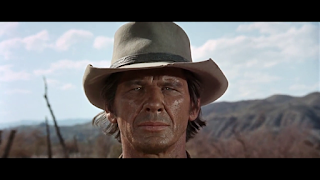“Once
Upon a Time in the West”
Movie
Review
Once
Upon a Time in the West is a 1968 epic spaghetti western film directed by
Sergio Leone, written with Sergio Donati, and based on a story by Dario
Argento, Bernardo Bertolucci, and Leone. It stars Henry Fonda as the villain, Charles
Bronson as his nemesis, Jason Roberts as the robber, and Claudia Cardinale as
the newly widowed housekeeper. Widescreen cinematography by Tonino Delli Golli
and film score by Ennio Morricone.
The
story revolves around two storylines set in the old western town of
"Flagstone". First, a man named "Harmonica" seeks revenge
against the outlaw Frank. Second, Frank works as a hired gun for Morton, a
railroad tycoon who is trying to acquire some land owned by the Brett McBain
family. The story also introduces a second outlaw, Cheyenne.
Harmonica
ambushes and kills the three when the train arrives at the station. The dusters
they wear lead him to believe they are Cheyenne's men. Meanwhile, Frank and his
henchmen kill Brett McBain and his three sons at their farm, which they call
"Sweetwater". Frank leaves behind evidence to frame Cheyenne for the murders.
A
woman named Jill arrives in Flagstone, en route to Sweetwater, for what is assumed
to be her upcoming marriage to McBain. However,
Jill, a New Orleans prostitute, marries McBain while there, making her
Sweetwater's sole heir. McBain knew that one day the railroad would pass
through Sweetwater, and he planned to build an irrigation station on his
property subject to the withdrawal that McBain would lose Sweetwater if the
station was not built by the time the railroad reached that location. Morton
sends Frank to intimidate McBain, but McBain's murder and Jill's inheritance
put Morton and Frank at odds. Morton wants to make a deal with Jill, but Frank
wants the land for himself.
Cheyenne
denies his men tried to ambush Harmonica, and the two learn that Frank is
behind both the ambush and framed Cheyenne for the McBain murders. Harmonica
discovers the connection between Frank and Morton but is captured by Frank's
men. When Frank asks for Harmonica's identity, he replies with the names of the
people Frank killed. Cheyenne rescues Harmonica and the two help Jill rescue
Sweetwater.
Jill
decides to auction off the land and return to New Orleans; however, Frank's
henchmen bully bidders into buying the land at a lower price. Harmonica appears
with Cheyenne and bids $5,000, which is the price on Cheyenne's head as a
wanted fugitive. Morton hires Frank's own men to
kill Frank, but Harmonica intervenes to protect Frank's hideout for himself.
Meanwhile, Cheyenne escapes custody and he and his gang engage in a shootout
with the rest of Frank's gang on Morton’s train. All are killed, including
Morton, except Cheyenne, who goes to Sweetwater.
After
witnessing the aftermath of the shooting, Frank heads to Sweetwater, where he
finds Harmonica waiting. Cheyenne has also arrived but is at the farmhouse with
Jill. Harmonia draws the game by defeating Frank. When Frank lies about dying,
he again questions Harmonica's identity. In a flashback, it is revealed that
Frank shoved a harmonica into a boy's mouth just before the boy collapsed under
the weight of his hanging older brother. Now, Harmonica returns the instrument
back to Frank by placing it in his mouth. Frank realizes who shot him.
Harmonica
and Cheyenne leave Sweetwater, but Cheyenne collapses and dies from a gut wound
received from Morton in the shootout. As Harmonica departs, Jill gives water to
the railroad workers.
After
directing The Good, The Bad, and The Ugly, Leone decided to retire from
Westerns and decided to make his film based on The Hood's novel, which would
eventually become Once Upon a Time in America. However, Leone accepted an offer
from Paramount Pictures, which offered Henry Fonda and the budget to make
another Western. In 1966 he recruited Bertolucci and Argento to plot the film,
researching other Western films in the process. After Clint Eastwood turned
down an offer to star in the film, Bronson was offered the role. The film is
the first part of Leone's Once Upon a Time trilogy.
In
2009, the Library of Congress preserved the film in the United States National
Film Registry as "culturally, historically, or aesthetically
significant."
WATCH THE REVIEW VIDEO FOR MORE...












0 Comments